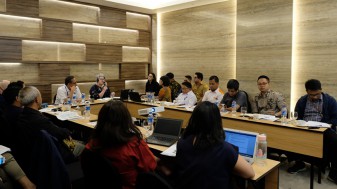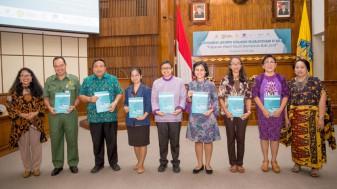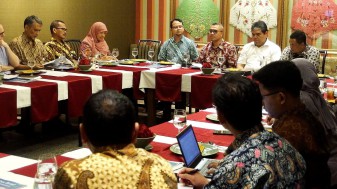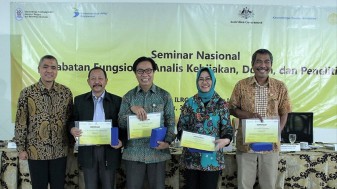by Widya Sutiyo
The Bappenas Knowledge Centre, with support from KSI, visited the provincial Bappeda of North Sulawesi on 6-8 February 2017 to identify and verify smart planning and budgeting practices. The Bappenas Directorate for Development Funding Allocation, together with KSI consultants and staff joined the visit. The program included a plenary discussion attended by around 50 people representing various stakeholders from the province of North Sulawesi. This was to document information on the process and mechanisms of the practice in budgeting. There was also a field visit to Kota Bitung to see its continuing implementation of “smart” practices.
The Health Agency of North Sulawesi (Dinas Kesehatan) presented information relevant to the identification process, focusing on the formulation of unit costs in health to help achieve appropriate funding for health programs, particularly in trying to achieve MDG/SDG targets for maternal mortality. They have institutionalised a unit cost policy, which is currently being adopted in a number of neighbouring districts and provinces. This regulatory framework helps the Health Agency to argue its budget with DPRD and other work units during APBD formulation. The Bappenas team commended the Health Agency for its effort to have well-planned health programs based on actual costs and evidence, and encouraged other agencies to implement the same mechanism. Bappenas also commended the government’s budget team in safeguarding the formulation of the unit cost to ensure transparency and accountability. The institutionalisation of this smart budgeting practice can help address regular changes of officials at national and local levels.
Bappenas is aware of the complexities of identifying and verifying “smart” practices across Indonesia, realising that substantive discussion is difficult, as most participants end up requesting support from Bappenas. The Knowledge Centre Team recognises of the value and importance of conducting surveys to identify and verify smart practices, instead of preparing questionnaires for self-assessment by the initiator of smart practices. Further thinking is needed on this aspect as it has a budget implication for the scaling up of the Knowledge Centre. Initial thinking is that Bappenas can outsource some functions of the Knowledge Centre (identification, verification, documentation, dissemination), leaving Bappenas to only facilitate replication/adaptation through written/official endorsement and discussions during planning and budgeting processes.






